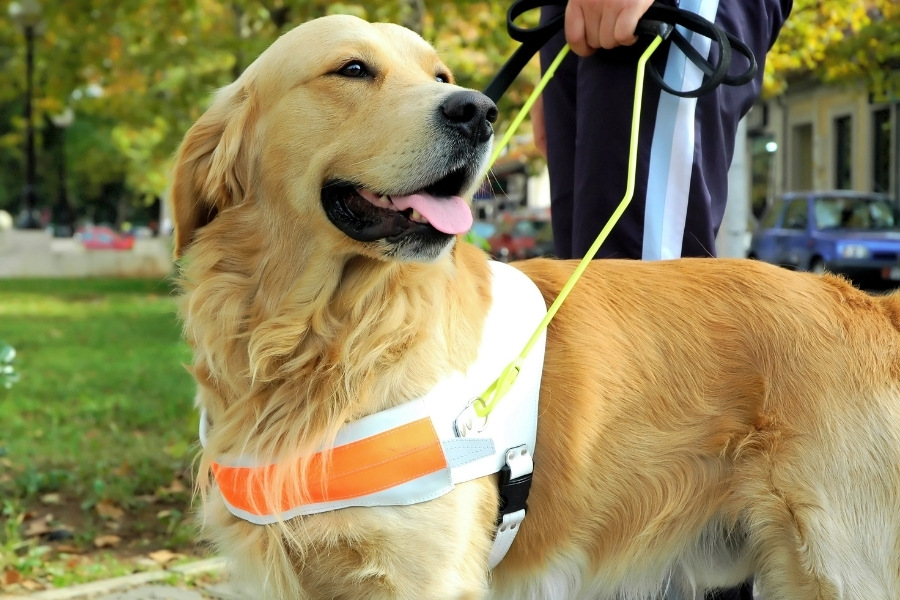
Managing Service Dog Discrimination
- Published on:
- By: ASP Team
Unfortunately, many have faced the challenges of judgment and unfair treatment throughout history. Discrimination (for any reason) is nothing new. One group of people who are accustomed to these injustices is the disabled community. The ADA and other organizations have worked tirelessly to bring an end to our nation’s broken system. This is wonderful news! But alas, Service Dog owners still face harsh realities as society fumbles to interact. Let’s explore what can be done from a practical standpoint, and why managing Service Dog discrimination effectively is so valuable.
Why does Service Dog Discrimination Exist?
The answer to this question is a bit complicated. In recent years, there has been a rise in the occurrence of fake Service Dogs in public places. News headlines have highlighted instances of poorly behaved or aggressive animals in public settings being misrepresented as legitimately trained Service Dogs. To be clear, there is never any reason to fake a Service Animal, and the risks to everyone are very real.
Today, Service Dog handlers AND business owners are being faced with impossible choices. Under the law, public establishments are not permitted to turn away a REAL Service Animal. If these businesses attempt to use their best judgment and are wrong, they could be looking at a serious lawsuit. However, should they not choose to turn away suspicious animals, they run the risk of endangering their patron’s and the reputation of their establishment. Regrettably, it can also be a challenge to effectively train employees (including law enforcement) to act accordingly when the need arises. That was clearly the case for this retail clothing store in Winston-Salem, NC. A lack of both empathy for the disabled community and quality Service Animal education is evident all around.

Get Your ESA Today
ATTENTION
Due to the new Department of Transportation (DOT) policy, Emotional Support Animals are NO longer allowed to fly in airplane cabins for free. However, Psychiatric Service Dogs are eligible.
Emotional Support Animal claims have also pushed the boundaries of limitation on more than a few occasions. Much mental health controversy surrounded the Air Carriers Access Act. The ACAA used to allow flight provisions for documented ESAs. While any species, breed, and size can be a true Emotional Support Animal, there are general guidelines and protocols in place. Those with legitimate disabilities gladly respect these boundaries. Sadly, due to misrepresentation and exhaustive chaos by a small subset of individuals, most of the previously granted ESA privileges are no longer legal mandates. I don’t think anyone will soon forget the predicament of Dexter the peacock or the woeful fate of Pebbles the hamster. Now airlines have the right to choose whether or not they will allow provision, and that doesn’t always bode well for those with verifiable needs.
Discrimination exists for many reasons, but for most Service Dog owners, these examples provide great insight into the battles they encounter. These days, the mere mention of a Service Dog raises defenses and increases discrimination for the disabled. It is even more prominent with Psychiatric Service Dogs considering mental health disabilities are often invisible to the naked eye. Notably, some medical disabilities can be imperceptible (such as diabetes or seizure disorders). Just because you cannot immediately detect a disability does NOT mean that one doesn’t exist! This truth may confuse those outside the community, and open the door for bias and skewed perceptions all around.

How Psychiatric Disabilities are Affected
Have you ever heard the phrase “don’t judge a book by its cover”? This certainly strikes a cord of relevancy for the mentally disabled. As stated, there are plenty of diagnosable yet generally invisible psychiatric conditions. Some of these include PTSD, Anxiety, Depression, Panic Disorder, and Bi-Polar (though there are more). Since mental health stigma already exists, it doesn’t come as a surprise that Psychiatric Service Animal discrimination would follow. If individuals don’t accept the disability, to begin with, why would they accept the validity of a Service Animal for assistance?
At times, when healthy individuals consider a “disability” they tend to limit their scope of recognition to things such as vision impairments, amputation(s), or genetic malformations. If one can easily notice the need for assistance, they are more likely to show acceptance and understanding. What many fail to realize, is that mental health disabilities create a myriad of physical limitations. Psychiatric Service Dogs can be task trained in so many ways to mitigate these effects and help their handlers thrive.
There can be genuine confusion over the difference between an Emotional Support Animal and a Service Animal. We understand that misinformation abounds. You can find accurate and helpful information regarding this topic here. We believe that in the appropriate context all ESAs and PSAs are a vital part of mental health management.
Best Practices in Tough Situations
Those with legitimate disabilities and honestly trained Service Dogs are aware of their rights as well as their responsibilities. For a full list of Service Dog rules and allowances, please refer to the official ADA site. Let’s go over the basics!

Service Dogs requirements DO include:
- Training to perform tasks that mitigate symptoms of a disability
- Behaving safely and appropriately in public
- Responding to their handler at all times
- Following the same health and safety directives as any other animal (such as vaccination schedule and veterinarian care)
Service Dogs requirements do NOT include:
- The use of any visual identification (though this can be useful)
- Registration on any “official” list
- The performance or demonstration of tasks on command by anyone other than their handler in actual need of assistance.
Furthermore, a handler is only to be asked two simple questions: 1) is the animal a Service Animal required because of a disability? 2) what work or task is the animal trained to perform? Handlers never have to answer specific questions regarding their disability or treatment.
Service Animals cannot be legally turned away from any public establishment without probable cause (i.e. dangerous or inappropriate behavior).
So what should you do if the allowable guidelines are challenged anyways? Good question, because it does happen! You can read accounts of Service Animal discrimination (just like this one) all across the internet. We recommend the following tips to help diffuse any negative situations that arise:
- Keep Calm – Whenever possible, be sure to use a low and steady tone of voice. Take a moment to breathe. Focus on your dog to bring your emotions down. It will not help you to increase your anxiety level, and chances are that the incident is being recorded. It will surely work in your favor to remain respectfully composed. If you are facing mental health challenges, high-stress situations can make this step more difficult. Do your best!
- Be Clear – State your basic rights, under the ADA, as a Service Dog owner. Let the individual or establishment know how those rights are being violated. Freely offer only the information required under the law. Emphasize that you are not seeking any altercation. Maybe even offer to get the ADA Information Hotline on the phone if they prefer the information to come from a government authority.

3. Ask for Someone Else – If the individual you are speaking with continues to challenge you, ask to speak with a manager, supervisor, or the ownership when available. In many cases, the entire establishment does not share the same bias as one or two uninformed (or simply hotheaded) employees. Give the place a chance to make it right.
4. Determine the Best Outcome – Lastly, in cases where you are unable to quell the disagreement and come to a satisfactory understanding, you will have to make a final choice. Would it be best for you, at that moment, to walk away or to involve police reinforcement? Only you can make that determination, but if you feel that further action will be needed then a police report can be useful.

How American Service Pets Can Help
One of the most powerful tools in life is access to knowledge and resources. Here at American Service Pets, we strive to equip individuals with both!
If you have found yourself dealing with an incident of discrimination that did not resolve, we are so sorry you had to experience that. Our best next-step advice would be to reference Title II of the ADA. There are sections of the ADA that specifically cover access rights for individuals with a disability. You can begin by reading the Technical Assistance Manuals. Hopefully, this will provide a better understanding of the laws and guidelines for filing a suit or discrimination complaint.
Once the process starts, rectification will likely follow swiftly. At times, however, Service Dog access challenges and disputes can progress to lawyers. AnythingPawsible.com points out that having your canine’s tasks documented is beneficial in cases of escalation. Any training logs, videos of successfully completed tasks, and Public Access Tests will be important. Again, your documentation of the situation and the police report can be a great help. Involving a knowledgeable disability advocate can be a true asset to guide and support you through the process.

We determined that identifying visual aids such as vests and patches, personalized ID cards, and Psychiatric Service Dog Letters are not required under the law. However, these items can prove to be very helpful during times of push-back from public establishments or even places of employment. Having readily available “evidence” of your animal’s status may put an end to an argument before it truly begins. Particular documentation is also necessary to make Service Animal flight arrangements. Having them on-hand will save lots of time and stress should you choose to travel!
American Service Pets offers all of these services. Our PSA packages also include valuable self-training tips for common tasks. No matter your circumstance, we would love to help answer any questions or concerns regarding an ESA, PSA, or your rights! Don’t hesitate to reach out to our amazing customer support team for assistance. It is always our pleasure to help.

The benefits of an Emotional Support Animal certification and a Psychiatric Service Dog certification are drastically different. Fortunately for you, American Service Pets’ network of active board certified doctor or other licensed mental health providers can help you find the right path to certification. To find out whether you need an ESA or PSD letter, take our easy, three-step Pet Owner Survey!
More Great Resources




